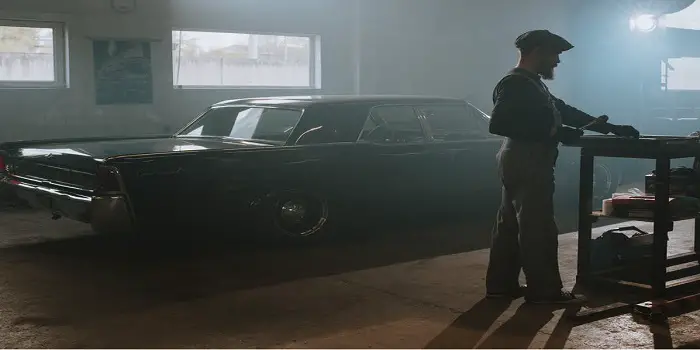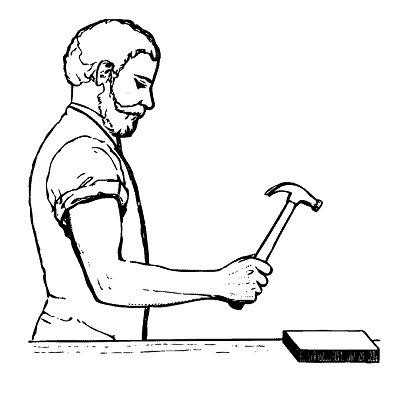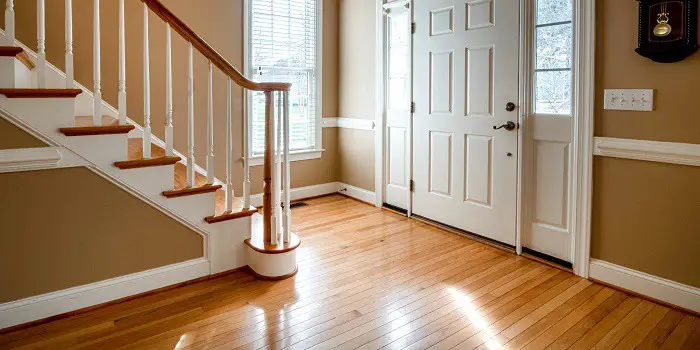
Of the many floor options available when building your garage, a wooden floor might not be the first that comes to mind.
But if your current garage has a dirt floor, then digging it out to pour concrete can be expensive.
Over time, even concrete can become compromised due to the weight of the vehicles.
As an alternative, a wooden floor, when adequately engineered, is a viable option.
It may seem counterintuitive initially, but the right wood in the garage can be quite strong and easily hold up to the weight of the vehicles inside the garage for a lifetime.
So, if you still wonder, your garage can have a wooden floor. The answer is yes – even though the practice of putting on a wooden floor is not common for garages.
Can a Wood Floor Support Your Car?
If the flooring is put in correctly, the answer is yes.
Wood can support the weight of vehicles for a long time without bending or cracking under the proper conditions.
The International Building Code or IBC dictates that garage floors should be able to support at least 3,000 pounds per vehicle.
So, a two-car garage should support at least 6,000 pounds.
A wooden garage floor that is framed with beams every twelve feet and joists every two feet will support the weight of the vehicles stored in the garage.
The wood itself must be made of materials that will not combust or absorb other materials.
This means fire retardant and waterproof or at least water-resistant wood should be used to protect the flooring from motor oil and other liquid properties.

Pros and Cons of a Wooden Garage Flooring
No matter the choice you make for the flooring of your garage, there will be advantages and disadvantages to the material that you select.
For wooden floors, the pros and cons should be carefully considered before making your final decision.
The Pros
1- Accessibility:
If you need to access the areas below the wooden floor, that is far easier to do compared with concrete.
For those who want to install a dust collection unit, for example, you can run your power just about anywhere under the flooring.
This provides a freedom that is not nearly as convenient compared to a concrete floor.
2- Durable:
Pressure-treated wood can sustain heavy loads over a long time.
In addition to storing your vehicles (cars, motorcycles, trucks, or RVs), a wooden floor for your garage is also perfect for holding benches and tools and storing other items as well.
When properly maintained, a wooden floor can be almost as durable as concrete. Plus, it will not wear or crack as concrete may do over time.
Plus, if a section of the wooden flooring is damaged, it can be replaced at a lesser cost than replacing part of a concrete floor.
3- Flexibility:
If your goal is to turn your garage into a workshop or an area where you work for hours at a time, then a wooden floor provides plenty of giving.
In other words, less flexible materials such as concrete can create soreness in the back, legs, and feet when standing for hours at a time.
Wooden floors provide enough give to make it easier to stand and kneel when needed.
4- Insulation:
One downside of a concrete floor is during the winter when it holds the cold of the ground close to the surface.
A wooden floor insulates against the cold and can help keep the temperature of the garage warmer over the winter months.
5- Painted or Stained:
Getting your floors painted or stained is easy and cost-effective when you need to upgrade your garage flooring.
Generally, protective seals such as hardwood floor paints or epoxy paints are good to have on wooden garages.
And the good thing is you do not have to hire any professionals to get the job done.
The Cons
While there are plenty of advantages to a wooden floor for your garage, there are some issues you need to know about as well.
The goal is to make the best-informed decision about what type of flooring works for your garage. So, here are the downsides of wooden flooring for your garage…
1- Fires:
If the wood is properly treated, then the risk of fire is minimized.
However, even the best-treated wood may still present an issue depending on the type of fire that breaks out.
2- Humidity:
Wood can warp and rot under moist conditions.
However, engineered hardwood is less likely to warp or become damaged due to rot, especially if you have treated and sealed the floor as recommended.
But no matter what type of wood you have, still, the flooring will be vulnerable to seepage from underneath over time.
3- Pests:
Wood is the home to many pests, with termites and beetles being at the top of the list. Despite all the issues with concrete, it is not nearly as vulnerable to pests as wood.
So, you will need to look over your location and what pests are nearby when considering a wooden floor.
4- Smooth:
If you have benches and equipment on wheels, they will travel easier over a concrete floor as compared to wood.
While your wooden garage floor is smooth, there is some resistance or friction present that concrete does not possess.
It is a small issue, but over time you may find that small ruts or marks develop on wood when moving benches or equipment on wheels.
5- Spills:
This may be the biggest downside to a wooden floor for your garage.
Unlike concrete which can be sealed to make spills hardly an issue, wooden floors can absorb motor oil, alcoholic liquors, and other liquids and particles easier.
Even when properly treated and sealed, a wooden floor is more likely to be stained or discolored compared to a sealed concrete floor.

Can You Drive or Park Your Car Over Plywood?
Yes, you can drive or park a car over plywood in the garage, but it is not recommended.
Plywood is not immune to rot, but it is more resistant than many other types of wood. Depending on the conditions, plywood can last for years without rotting.
However, if plywood is exposed to excessive moisture or humidity, it will begin to break down and rot more quickly.
Driving or parking your car on plywood can damage it and make it more difficult to remove later.
If you must drive or park on plywood, be sure to use a protective mat or tarp underneath to help prevent damage.
Hardwood floor in a car trunk?
Although you can have a hardwood floor in a car trunk, I don’t recommend it.
Car trunks are often exposed to extreme temperatures and moisture, which can damage the wood.
In addition, driving with a hardwood floor in the trunk can cause the wood to shift and possibly scratch or dent the car’s interior.
Wooden Garage Floors: Should You Really Go for It?
If a wooden floor is the best option based on your needs and the structure of your garage, then it should be at the top of your list.
What is essential to understand is that a wooden garage floor is a viable option for most garages.
I think these are the reasons why wooden flooring for your garage should be considered.
- Aesthetics
- Comfortable
- Good Investment
- Workable & Easy Maintenance
This type of flooring makes for a comfortable work area where you can spend many hours creating projects.
It is also beautiful when installed correctly and when you have used the right type of wood.
So, before installing, consider that your wooden garage floor is not just a purchase but an investment in your home.
Final Thoughts
Remember that you do have options other than concrete when it comes to the flooring of your garage – wood is one of them.
But the first thing is to consider how the garage will be used. For example, if you are using your garage as a workshop, then a wooden floor may be the perfect option.
Another is any structural issues that might be present. That will help you choose the best flooring option available.
Make sure you consult with a structural engineer beforehand to ensure that your garage is suited for a wooden floor.
Share the post "Can You Put a Wood Floor in Your Garage – The Pros & Cons"

Hi, I am Mark Garner a professional carpenter, woodworker, and DIY painter. I live in the small city of Peoria, Arizona as a semi-retired woodworker. I have started this blog with a simple motive to help you with my wood experience in this sector. If you like to know more about what I love doing and how it all got started, you can check more about me here.




